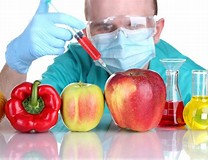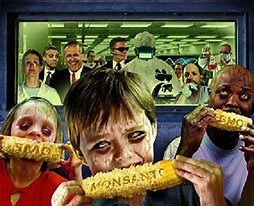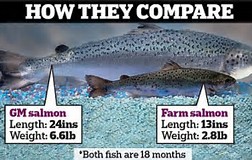By now, you are aware that most of the food we are eating,
in the USA anyway, is GMO, or genetically modified. Yummy. Doesn’t that sound
appetizing? Genetically altered food? Not to me either , especially when I know
what it is all about. The thought of altering any food genetically doesn’t make
my taste buds salivate at all. Oh, I know. The government assures us it is
safe. They also assured soldiers in Vietnam that Agent Orange was nothing to
worry about, after they had been sprayed and came back home to America ill and
dying. I, for one don’t trust anything the government says anywhere because
they are always lying. How do you know when a politician is lying? When his/her
mouth is open. Seriously, to me, genetically modified food isn’t a good thing. I don't like the idea of eating things that were sprayed with herbicides. Why would I want to eat something that was modified to include the chemicals in its makeup? Seriously, until just a couple of years ago, I had no idea that most of our foods are GMOs. Not a clue. Once I heard about it, I did some research. A great deal of research. I wasn't overjoyed with what I found. The result is this post.


What You Need to Know about GMO Crops:



To get a better idea of why I don’t like GMO you need to
know more about it. First, what exactly is a GMO food? A GMO, or genetically
modified organism, is a plant, animal, microorganism or other organism whose genetic
makeup has been modified using recombinant DNA methods (also called gene
splicing), gene modification or transgenic technology. “This relatively new
science creates unstable combinations of plant, animal, bacterial and viral
genes that do not occur in nature or through traditional crossbreeding methods.”
Are they safe? First, define safe. Second, most developed nations do not
consider GMOs to be safe and have significant restrictions or outright bans on
the production and sale of GMOs. The U.S. and Canadian governments, though, “have
approved GMOs based on studies conducted by the same corporations that created
them and profit from their sale.” Bingo. This is my point.
Are they labelled in
order for the consumer to make an informed choice when purchasing? Not in the
USA they’re not despite strong support to do so. “Sixty-four countries around
the world, including Australia, Japan, and all of the countries in the European
Union, require genetically modified foods to be labelled 1. While a 2015 ABC
News survey found that 93% of Americans believe genetically modified foods
should be labelled, GMOs are not required to be labelled in the U.S. and Canada. In fact, Congress shot down the chance to mandatory label all GMO foods last year. In the absence of mandatory labeling, the Non-GMO Project was created to give
consumers the informed choice they deserve. “ Did I mention that GMO foods are mixed with herbicides during the genetic process to create
disease/pest resistant crops? Yummy again don’t you think?
Which foods you eat contain GMO foods? Good question and
here’s the answer. More than you think. More than I like. Most packaged foods
contain ingredients derived from corn, soy, canola, and sugar beet — and the
vast majority of those crops grown in North America are genetically modified.
In fact, I was surprised to find that two of my favorite junk food, Lays Potato
Chips and Ghiradelli chocolates both contain GMO products. Fortunately, these
two companies are honest enough to let you know right on their product labels. Do
these foods harm farmers and their farms? “Because GMOs are novel life forms,
biotechnology companies have been able to obtain patents with which to restrict
their use. As a result, the companies that make GMOs now have the power to sue
farmers whose fields are contaminated with GMOs, even when it is the result of
inevitable drift from neighboring fields. GMOs therefore pose a serious threat
to farmer sovereignty and to the national food security of any country where
they are grown, including the United States and Canada. Nice, huh? So much for
safety.” I wrote to my government representatives a few months ago about my concern about GMO foods and mandatory labeling. Of course, I received the standard answer about all the mandatory testing it went through and that is is "considered" safe. I'm willing to bet my government representative doesn't eat the stuff.
How about my health? Your Health? Are GMOs safe for our
health? Those that support GMO foods say they are. As I already said, define
safe. “The contention that GMOs pose no risks to human health can’t be
supported by studies that have measured a time frame that is too short to
determine the effects of exposure over a lifetime,” says Robert Gould, M.D.,
president of the board of Physicians for Social Responsibility. I concur. Not
to mention that they may worsen or cause allergies. “have the potential to
introduce toxins and new allergens (or increase levels of existing ones), or
cause nutritional changes in foods and other unexpected effects.” Further, “Animal studies—commonly used to
help assess human health risks—have suggested that GMOs might cause damage to
the immune system, liver, and kidneys. More studies are needed to determine
long-term effects. And the ability of researchers to track potential health
effects of GMOs in the human population is hampered by the absence of
labeling.” So again, exactly how safe are they? Not safe enough for me. Take
into account that when a medication is introduced to the public, it’s already
undergone years for drug trials and studies. Yet, even after all that,
sometimes, quite often, in fact, the FDA
has to remove them from the market because, as it turns out, those drugs weren’t
really safe at all. How can we then assume that GMO foods are safe? We can’t.
And if they’re so safe, why is the government and supporters so afraid to label
them GMOs?
As if all of this enough, what about the effects of GMO
foods on our fragile environment? What are the impacts of GMOs on the
environment? “More than 80% of all GMOs grown worldwide are engineered for
herbicide tolerance 5. As a result, use of toxic herbicides like Roundup has
increased 16 times since GMOs were introduced 6. GM crops are also responsible
for the emergence of herbicide resistant “super weeds” and “super bugs,” which
can only be killed with more toxic poisons like 2,4-D (a major ingredient in
Agent Orange) 7,8. GMOs are a direct extension of chemical agriculture and are
developed and sold by the world’s biggest chemical companies. The long-term
impacts of GMOs are unknown, and once released into the environment, these
novel organisms cannot be recalled.”
Genetically modified or engineered foods. Sounds inviting,
doesn’t it? Doesn’t the term just make you want to go out and go get some right
now? Me neither, which is why I always buy organic when given the chance, and,
of course, I hope that food is organic. I do know that GMO foods taste
differently, to me anyway. Organic does too. Organic foods taste better. GMO
foods taste worse. GMO foods are a relatively new concept. I’m not that old,
yet, but when I grew up, GMO foods weren’t in existence. They certainly weren’t
on our menu. That's because they've been around for a total of about fifteen years. As if herbicide sprayed crops, antibiotic and hormone filled
animals aren’t enough to make us ill, literally, along comes GMO foods. Not for
me and mine. That’s my opinion anyway, for what it’s worth. I hope this post
raises your awareness about GMO foods in order that you, the consumer can make
an informed choice for you and your family. What’s your view? Do you eat GMO
foods? Why or why not? Do you even care that your food is genetically modified?
Why or why not? Let’s talk about it.
For more information:
Here are two articles that gave me a great deal, but not all
of the information I wanted to know about GMO foods:
Activists Weigh Path Forward After
Congress Thwarts GMO Food Labels
What You Need to Know about GMO Crops:
GMO foods: What you need to know
1. “Center
for Food Safety | Issues | GE Food Labeling | International Labeling Laws.”
Center for Food Safety. N.p., n.d. Web.
2. Langer,
Gary. “Poll: Skepticism of Genetically Modified Foods.” ABC News. ABC News
Network, 19 June 2015. Web.
3. Fernandez-Cornejo,
Jorge, and Seth James Wechsler. “USDA ERS – Adoption of Genetically Engineered
Crops in the U.S.: Recent Trends in GE Adoption.” USDA ERS – Adoption of
Genetically Engineered Crops in the U.S.: Recent Trends in GE Adoption. United
States Department of Agriculture, Economic Research Service, 09 July 2015. Web.
4. Leader,
Jessica. “Monsanto Wins Lawsuit Filed By U.S. Organic Farmers Worried About
Seed Contamination.” The Huffington Post. TheHuffingtonPost.com, 10 June 2013.
Web.
5. Duke,
S.O., & Powles, S.B. (2009). “Glyphosate-resistant crops and weeds: Now and
in the future.” AgBioForum, 12(3&4), 346-357.
6. Kustin,
Mary Ellen. “Glyphosate Is Spreading Like a Cancer Across the U.S.” EWG.
Environmental Working Group, 07 Apr. 2015. Web.
7. Mortensen
DA, Egan JF, Maxwell BD, Ryan MR, Smith RG. “Navigating a critical juncture for
sustainable weed management.” BioScience. 2012;62(1):75-84.
8. “Newsroom.”
Agent Orange: Background on Monsanto’s Involvement. N.p., n.d. Web.
That’s it for this time. Thank you all for visiting with us. Until next month, every one please stay safe. Smile. Be happy. Show compassion. Be nice to others. Put a little love into your heart. Please speak up for those without a voice, whether it be a dog, cat, elephant or monkey. One person, one voice can make a difference. Read a book. Review it. Share it. Pass it along.
Make adoption your first option when seeking a pet. Adopt. Don’t shop. Can’t adopt. Please consider fostering one. The animal will have the taste of home and the shelter will cover the expenses. Can’t foster? Make a donation or volunteer at your local shelter. Please, don’t hunt. Unless you’re starving down in a ditch somewhere, there is no logical reason to do so. Whatever you do, however you do it, please be a voice for the animals large and small. All it takes is one to make a difference, good or bad.
Together, you and I can make a difference. If you like what you see here, please consider signing up to become a follower. Please feel free to share this post with others.
Regards,
S.J. Francis Writing is my passion, but animals are my world.
In Shattered Lies: "Good and bad, it's All About Family." Available now from Black Opal Books and for sale at on-line retailers and independent booksellers.
“Some secrets should remain that way.”
My web page: http://www.sjfranciswriter.com
Twitter: https://twitter.com/sjfrancis419
Facebook fan page: https://www.facebook.com/pages/SJ-Francis/480058115420325
My writing Blog: http://sjfranciswriter.blogspot.com

Twitter: https://twitter.com/sjfrancis419
Facebook fan page: https://www.facebook.com/pages/SJ-Francis/480058115420325
My writing Blog: http://sjfranciswriter.blogspot.com
A Book Review 4 U: http://abookreview4u.blogspot.com
A Consumer's View: http://aconsumersview.blogspot.com
Pinterest: http://www.pinterest.com/sjfrancis419/
Google Plus:https://plus.google.com/u/0/104831238907682620486/about
Good Reads: https://www.goodreads.com/user/show/33550975-s-j
Google Plus:https://plus.google.com/u/0/104831238907682620486/about
Good Reads: https://www.goodreads.com/user/show/33550975-s-j
And now for some legal stuff: Copyright 2017 by S.J. Francis. Opinions expressed here are solely those of the author, S. J. Francis and are meant to entertain, inform and enlighten, and intend to offend no one.












